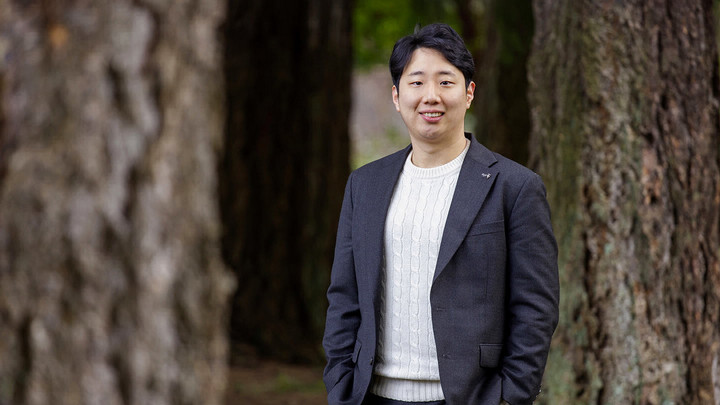From H2O to the power of H
March 13, 2024

The world needs clean renewable energy, we need it now, and Jason Keonhag Lee is catalyzing the transition for us. Drawn both by the challenges and how they connected to his existing knowledge, he has set his sights on hydrogen, a very light and highly explosive element, as a power source.
During his years as an undergraduate and then Master’s student in mechanical engineering at UVic, Lee’s interests lay in manufacturing. By the time he started his PhD, though, he had shifted gears.
“I had become more and more concerned about climate change,” he says. "I wanted to research clean energy.”
Lee knew his background in manufacturing wasn’t going to be enough make a difference in this new-to-him field—he was going to have to embrace a new learning curve. So he blended chemical engineering, the processes of converting raw materials into useful products, with mechanical engineering, which relies more on physics and mathematics to design, analyze, manufacture and maintain mechanical systems.
Lee created an intersection where his expertise really shines. His research as a PhD student and a post-doctoral fellow focused on making more efficient, more cost-effective and scalable materials to electrolyze water into oxygen and that powerhouse hydrogen. He doesn’t mince words about the potential importance of this work.
“Clean hydrogen, if produced by water electrolysis using renewable electricity, stands at the epicenter of decarbonizing various hard-to-decarbonize sectors that rely heavily on fossil fuels…” reads the introduction to Lee et al’s 2023 Nature article.
In controlled conditions, hydrogen can be burned to release a lot of energy with only water as a byproduct. But the source of the hydrogen can be problematic: if it’s extracted from fossil fuels, as it usually is, the byproducts are the same greenhouse gases that are causing climate change. Water, says Lee, is a great source—if we could safely extract it.
“I found the workings of the device (hydrogen fuel cell and electrolyzer) fascinating from the viewpoint of a mechanical engineer,” he explains. “The complicated multi-phase flow inherent to these systems was intriguing.”
“The more research I did in this area,” Lee says, “the more engaged I got.”
In fact, his expertise and enthusiasm earned him a three-year post-doctoral fellowship, and national recognition, at the Lawrence Berkeley National Laboratory in the US, where he worked on H2NEW, Hydrogen Next-generation Electrolyzers of Water. His ultimate goal, Lee says, is to help drive down the cost of clean hydrogen as an energy source.
His manufacturing expertise continues to come in handy for that. Lee is exploring the possibilities for recycling (“thrifting”) titanium and iridium, which are hard to mine and expensive, to create electrodes that will efficiently split water into hydrogen and oxygen.
Lee joined the faculty of UVic’s department of Mechanical Engineering in January but his heart had never really left the island. (In a small spiral of coincidences, his University of Toronto PhD supervisor had been a PhD student of UVic’s Ned Djilali, whose course on fuel cells Lee will be teaching in September.)
“I always wanted to come back to UVic,” Lee says. “I received both academic learnings and hands-on experience here. All my co-ops were in a research lab, which helped me envision being a researcher and a faculty member.”
His research in this area of clean energy makes Lee a terrific addition to the Accelerating Community Energy Transformation (ACET) team, as well as the Faculty of Engineering as a whole. Clean hydrogen production complements the other renewable energy projects of ACET team members: tidal, wave, wind and more.
He’ll be sharing lab space with ACET executive director Curran Crawford and has already connected with researchers at partner universities across Canada.
And he’s inspired by the equity, diversity and inclusion activities that are part of the ACET program. He’s gaining new ideas for how to train highly qualified personnel and foster a research environment that embraces EDI.
“Excellence is not gendered,” Lee says. “It’s a personal trait and everyone should have the opportunity to learn and to express that.”
Along with creating a strong, diverse research team and culture, and advancing clean hydrogen production, Lee is excited about advancing clean energy, period. And he intends to teach his students to become the pacesetters in clean technologies.
“I want UVic Engineering grads,” he says, “to lead this.”
